RSTMH Regional Meeting West Africa: Panel discussions
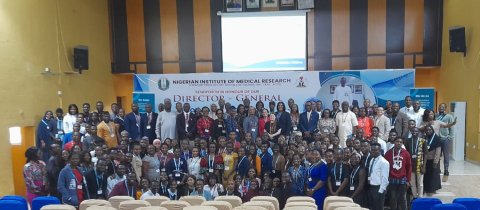
RSTMH Chief Executive Tamar Ghosh summarises a recent visit to Nigeria, where we hosted our first Regional Meeting 2024 - West Africa. Within this blog, she shares some of the discussions that took place throughout the day.
I was delighted to travel to Nigeria recently, along with Amelia Fincham, our Senior Manager, for the delivery of our very first Regional Meeting for the region of West Africa. The trip included the Regional Meeting for West Africa, Research in Progress West Africa, and a grant awardee workshop for awardees in the region.
The West Africa Regional Meeting was a scientific meeting on the theme of ‘Charting West Africa's journey to resilient health systems: overcoming challenges, embracing innovations, and cultivating future health leaders’. It covered the areas of injuries, NCDs and mental health, NTDs and infectious diseases, AMR, health security and digital technologies.
We were delighted to be delivering this meeting after many months of planning, and we were extremely lucky to be joined in person by our Trustees Professor Olaoluwa Pheabian Akinwale and Dr Quudus Yusuff. As well as some of our Country Ambassadors, Dr Francis Ohanyido, Country Ambassador for Nigeria, Dr Komi Assogba RSTMH Country Ambassador Togo and Saffiatou Darboe, Country Ambassador for The Gambia.
We are very grateful for all they did to make the day a huge success, and for their work along with Professor Olufemi O. Adewole and Professor Margaret Gyapong, who helped to establish such a great programme of speakers.
'Addressing NCDs, injuries and mental health'
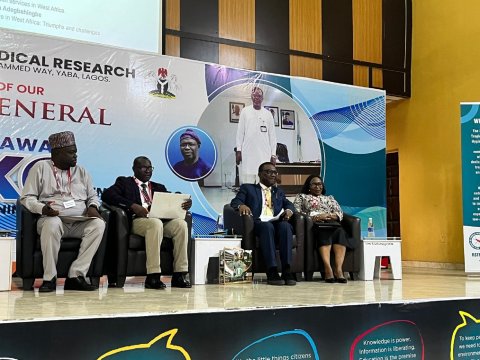
The first panel of the day was on ‘Addressing NCDs, injuries and mental health in West Africa’. During this panel we heard from Professor Akin Osibogun, Professor from the College of Medicine, University of Lagos. We heard about the importance of investment in prevention strategies due to a recent study showing the very high number of 35–60-year-olds in the region who are hypertensive and also the high number of deaths relating to NCDs. This is in contrast with the average age of those dying from the same cause in developed countries which is much higher. In this situation, the cost of investment in prevention would be beneficial, as income from the lost years in productivity outweigh the cost of treatment.
We also heard about barriers, including the cost of medication for NCDs, and the need to increase generic drug production, to address this. There is also a need, at this time, to promote community awareness, and engagement, and legislation to discourage the overuse of alcohol, as well as sugary foods and drinks.
Dr Mohammed Abdulaziz, Head, Division of Disease Control and Prevention at Africa CDC, spoke about how the impact of COVID-19 was more challenging, and caused more deaths for those living with NCDs, which highlighted the importance of addressing these for its prevention and control. Since then, Africa CDC has established NCDs as one of the main pillars of its new strategy for 2023-27. This strategy encourages both member countries to establish or enhance their plans for NCDs and also multi-sectorial and multi-country action.
The next panel member was Dr Morenike Alex-Okoh, Consultant Public Health Physician and the Founder/CEO of Global Health Strategies, who spoke about the barriers to accessing mental health services. She talked about the gaps in treatment across countries as well as the challenges of treatment costs, competing health priorities, and a lack of mental health experts in West Africa, especially outside of the cities. Stigma and discrimination are significant and are often due to reasons which include traditional beliefs and a lack of awareness of mental illness.
Professor Olayinka Oladiran Adegbehingbe, Paediatric Orthopaedic Surgeon, and Former Acting Chief Medical Director, Obafemi Awolowo University Teaching Hospital Complex, was the final speaker of this panel and spoke on the topic of trauma. He mentioned the recent successes in this area, including improved trauma management and capacity of experts in trauma care and surgery, along with new courses on trauma care, and emergency medicine. The challenges remain in the areas of infrastructure, funding, and capacity, in part due to increases in demand for trauma care due to war and conflict. He highlighted the disparities that exist, with trauma care less accessible in francophone countries and barriers for access based on many factors including gender, race, ethnicity, religion, socioeconomic status, age, cognition and disabilities.
The panel discussion with the audience touched on many issues including recognition of the need for coordination across West Africa on NCDs.
‘Ensuring health security’
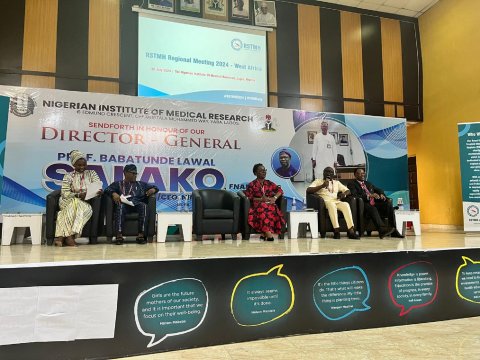
The second panel of the day was ‘Ensuring health security in West Africa’.
Dr Babatunde Ipaye, Team Lead, Peltom Global Services Ltd, spoke first on the topic of epidemic preparedness and mentioned that one of the greatest learnings from COVID-19 was the sense of isolation when we see a global shutdown of services. Many approaches are needed to address this and to strengthen capacity and one of the most important ones is the importance of incentivizing innovators to manufacture.
Dr Godswill C Okara, Registrar/Secretary General, West African Postgraduate College of Medical Laboratory Science, continued the discussion by talking about the importance of strengthening laboratories. This strategy would help address challenges in prevention, detection and rapid response which are all crucial to addressing outbreaks. This should be addressed at policy level for all countries and should accompany a national laboratory strategy plan to address preparedness for epidemics.
Dr Uduak Okomo, Clinical Assistant Professor, Maternal Adolescent Reproductive and Child Health (MARCH) Centre, LSHTM, next talked about the area of maternal, newborn and child health, given West Africa has the highest maternal morbidity in the region. This is due in part to a low take up of vaccines in some communities, as well as the need to strengthen health systems. There is a need for greater coordination and for shared learnings across the region, as well as more comprehensive approaches to the integration of healthcare.
'Harnessing the power of digital technologies for global health '
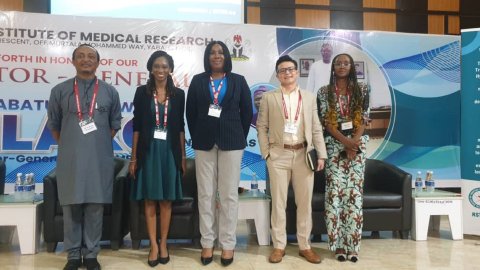
The third panel discussion of the day was on ‘Harnessing the power of digital technologies for global health in West Africa’.
Carlos Yerena, Director, Partnerships & on Growth, Reach Digital Health, was the first to speak and talked about the important role Artificial Intelligence (AI) could play if it used to answer the right questions in global health, can be scaled effectively.
Olabisi Dabiri, Manager Quality and Learning, mDoc, talked about the need for the region to focus even more on data, as an important starting point for utilising AI for global health. She talked about how AI has enabled us to move from standardised to personalised care.
Dr Nkem Onwumechili, Chief Executive Officer, Preston Associates for International Development talked about the ability for AI to utilise treatment algorithms to shorten the discovery time but cautioned that the algorithms must be developed to address local problems with local information.
'Combating NTDs, AMR, and infectious diseases'
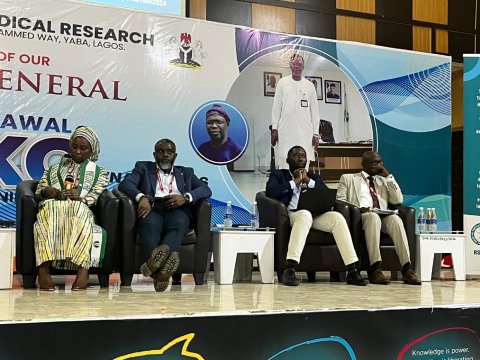
The final panel at the Regional Meeting was on the topic of ‘Combating NTDs, AMR, and infectious diseases in West Africa’.
Saffiatou Darboe, Microbiologist and Early Career Researcher at the Medical Research Council Unit The Gambia at LSHTM, and RSTMH Country Ambassador for The Gambia spoke about AMR, and highlighted that only 4 countries in Sub-Saharan Africa have developed their national action plans for AMR as of now, providing a great opportunity. Some of the reasons for AMR include misuse of antibiotics, high numbers of infections, lack of diagnostics including through labs. She stressed the priority of prevention in West Africa alongside the need for data recording.
Dr John Amuasi, Executive Director, African Research Network for NTDs, then spoke about how NTDs and AMR are both at high levels across LMICs. There are many reasons for this which he touched upon, along with mechanisms to address them, and, in particular, he talked about the role of NTDs treatment which involves the use of anti-microbials for individuals both with and without bacterial infections. He stressed the need to develop a pipeline of new antibiotic drugs.
Dr Piham Gnossike, National NTD Coordinator, Togo Ministry of Health, Public Hygiene and Universal Access to Care, mentioned the importance of partnerships for researchers and for coordination and collaboration at institutional level.
Dr Sunday Isiyaku, Executive Director, Reaching the Last Mile Oncho/LF for Sightsavers for Africa, was the last to speak on this panel and spoke of the importance of NGOs to deliver programmes driven by evidence, and of the role of NGOs to conduct research to deliver this evidence. NGOs have many unique strengths including their ability to work directly and secure learnings directly from communities and those working directly on delivering programmes.
Overall, the meeting was a big success, with 265 attendees and incredible speakers and discussions. As this was the first event of this type, we are currently requesting feedback from attendees, speakers and organisers, alongside analysing all aspects of the event. We hope to share information about the learnings of the meeting, as well as our future plans for it in the coming months.